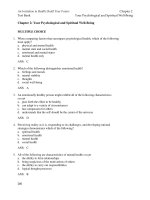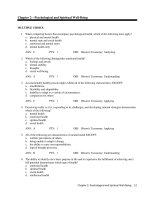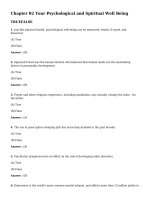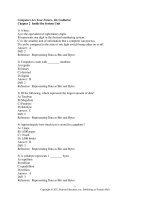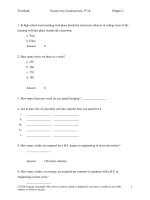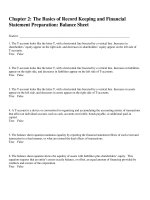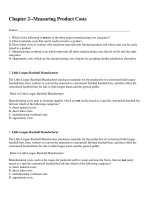An invitation to health building your future brief edition 8th edition dianne hales test bank
Bạn đang xem bản rút gọn của tài liệu. Xem và tải ngay bản đầy đủ của tài liệu tại đây (408.2 KB, 11 trang )
Chapter 2—Psychological and Spiritual Well-Being
MULTIPLE CHOICE
1. When comparing factors that encompass psychological health, which of the following most apply?
a. physical and mental health
b. mental state and social health
c. emotional and mental states
d. mental health only
ANS: C
PTS: 1
OBJ: Bloom's Taxonomy: Analyzing
2. Which of the following distinguishes emotional health?
a. feelings and moods
b. mental stability
c. thoughts
d. social well-being
ANS: A
PTS: 1
OBJ: Bloom's Taxonomy: Understanding
3. An emotionally healthy person might exhibit all of the following characteristics EXCEPT:
a. unselfishness.
b. flexibility and adaptability.
c. inability to adapt to a variety of circumstances.
d. compassion for others.
ANS: C
PTS: 1
OBJ: Bloom's Taxonomy: Applying
4. Perceiving reality as it is, responding to its challenges, and developing rational strategies demonstrates
which of the following?
a. mental health
b. emotional health
c. spiritual health
d. social health
ANS: A
PTS: 1
OBJ: Bloom's Taxonomy: Applying
5. All of the following are characteristics of mental health EXCEPT:
a. realistic perceptions of others.
b. being unable to adapt to change.
c. the ability to carry out responsibilities.
d. logical thought processes.
ANS: B
PTS: 1
OBJ: Bloom's Taxonomy: Understanding
6. The ability to identify one's basic purpose in life and to experience the fulfillment of achieving one's
full potential demonstrates which type of health?
a. emotional health
b. spiritual health
c. social health
d. intellectual health
Chapter 2: Psychological and Spiritual Well-Being
12
ANS: B
PTS: 1
OBJ: Bloom's Taxonomy: Applying
7. Which of the following translates into a capacity to sense, understand, and tap into the highest parts of
ourselves, others, and the world around us?
a. emotional intelligence
b. spiritual intelligence
c. intelligence quotient
d. emotional quotient
ANS: B
PTS: 1
OBJ: Bloom's Taxonomy: Understanding
8. Which of the following is the most basic human need, according to Maslow?
a. self-respect
b. food and shelter
c. protection from harm
d. receiving affection
ANS: B
PTS: 1
OBJ: Bloom's Taxonomy: Applying
9. According to Maslow's Hierarchy of Needs, which of the following would be achieved by individuals
who function at the highest possible level?
a. marital bliss
b. terminal happiness
c. self-actualization
d. basic fulfillment
ANS: C
PTS: 1
OBJ: Bloom's Taxonomy: Understanding
10. To evaluate things, people, events, and oneself, a person would utilize which of the following criteria?
a. values
b. beliefs
c. religion
d. expectations
ANS: A
PTS: 1
OBJ: Bloom's Taxonomy: Applying
11. Which of the following statements is FALSE with regards to self-esteem?
a. Individuals who welcome positive thoughts can bolster self-esteem.
b. Feeling a lack of encouragement as a child can influence an adult’s self-esteem.
c. You are born with self-esteem.
d. Self-esteem is based on internal factors.
ANS: C
PTS: 1
OBJ: Bloom's Taxonomy: Understanding
12. Which of the following describes a sustained emotional state that colors one's view of the world for
hours or days?
a. a feeling
b. an idea
c. a mood
d. a thought
ANS: C
PTS: 1
OBJ: Bloom's Taxonomy: Understanding
Chapter 2: Psychological and Spiritual Well-Being
13
13. Individuals who are true to themselves and develop independence demonstrate which of the following
characteristics?
a. optimistic
b. autonomy
c. assertiveness
d. extroversion
ANS: B
PTS: 1
OBJ: Bloom's Taxonomy: Applying
14. An autonomous individual has a locus of control that is:
a. negative.
b. internal.
c. individualized.
d. external.
ANS: B
PTS: 1
OBJ: Bloom's Taxonomy: Understanding
15. Having feelings of emptiness, hopelessness, and a sadness that does not end is a distinguishing
characteristic of which of the following?
a. anxiety
b. phobias
c. major depression
d. a panic disorder
ANS: C
PTS: 1
OBJ: Bloom's Taxonomy: Understanding
16. Which condition is characterized by experiencing feelings of great energy and euphoria alternated with
feelings of depression and despair?
a. major depression
b. panic attacks
c. bipolar disorder
d. acrophobia
ANS: C
PTS: 1
OBJ: Bloom's Taxonomy: Understanding
17. Another name for bipolar disorder is:
a. major depression.
b. simple depression.
c. common depression.
d. manic depression.
ANS: D
PTS: 1
OBJ: Bloom's Taxonomy: Remembering
18. An irrational, intense, and persistent fear of certain objects is known as:
a. a panic attack.
b. a phobia.
c. anxiety.
d. an obsession.
ANS: B
PTS: 1
OBJ: Bloom's Taxonomy: Remembering
19. A fear of heights is known as:
a. arachnophobia.
b. agoraphobia.
Chapter 2: Psychological and Spiritual Well-Being
14
c. acrophobia.
d. anxietalphobia.
ANS: C
PTS: 1
OBJ: Bloom's Taxonomy: Understanding
20. The fear of closed spaces is called:
a. claustrophobia
b. agoraphobia
c. anachrophobia
d. acrophobia
ANS: A
PTS: 1
OBJ: Bloom's Taxonomy: Remembering
21. Which of the following statements concerning phobias is FALSE?
a. A process called systematic desensitization is often used to treat phobias.
b. Phobias involve unreasonable fear of a specific object.
c. Phobias are anxiety disorders.
d. People with phobias are able to function normally despite their fear.
ANS: D
PTS: 1
OBJ: Bloom's Taxonomy: Understanding
22. When determining a treatment for panic attacks, which of the following would be the primary choice?
a. systematic desensitization
b. medication and cognitive-behavior therapy
c. hospitalization
d. medication only
ANS: B
PTS: 1
OBJ: Bloom's Taxonomy: Applying
23. Excessive or unrealistic apprehension that causes physical symptoms and lasts for 6 months or longer
is:
a. panic attack.
b. a phobia.
c. generalized anxiety disorder.
d. obsessive-compulsive disorder.
ANS: C
PTS: 1
OBJ: Bloom's Taxonomy: Applying
24. Which of the following best describes an obsession?
a. an unrealistic apprehension that causes physical symptoms
b. a recurring thought, idea, or image that is senseless
c. repetitive behavior performed according to certain rules
d. irrational, intense fear of certain objects
ANS: B
PTS: 1
OBJ: Bloom's Taxonomy: Understanding
25. Which of the following best describes a compulsion?
a. an unrealistic apprehension that causes physical symptoms
b. a recurring thought, idea, or image that is senseless
c. repetitive behavior performed according to certain rules
d. irrational, intense fear of certain objects
ANS: C
PTS: 1
OBJ: Bloom's Taxonomy: Understanding
Chapter 2: Psychological and Spiritual Well-Being
15
26. An individual who feels the need to check and recheck repeatedly whether or not the stove was turned
off is probably suffering from:
a. an obsessive-compulsive disorder.
b. a phobia.
c. generalized anxiety disorder.
d. depression.
ANS: A
PTS: 1
OBJ: Bloom's Taxonomy: Understanding
27. Spirituality is:
a. the same as religiosity.
b. identifying with the basic purpose in life and experiencing one’s full potential.
c. giving to your church on a regular basis.
d. praying at least once a day.
ANS: B
PTS: 1
OBJ: Bloom's Taxonomy: Understanding
28. A key difference between “spirituality” and “spiritual intelligence” is that:
a. old-fashioned morality is key in spiritual intelligence.
b. spiritual intelligence does not focus on a God above.
c. spirituality is more “happy and peace” based.
d. spiritual intelligence is more value-oriented than spirituality.
ANS: B
PTS: 1
OBJ: Bloom's Taxonomy: Understanding
29. Which is more likely to occur with sleep deprivation?
a. enhanced memory recall
b. weight gain by altering metabolism
c. less stress
d. more production of influenza-fighting antibodies
ANS: B
PTS: 1
OBJ: Bloom's Taxonomy: Understanding
30. An effective way to manage a bad mood you are experiencing is to:
a. blame others for your bad mood.
b. change what caused the bad mood.
c. use alcohol or drugs to numb the feeling and make it go away.
d. distract yourself by keeping busy.
ANS: B
PTS: 1
OBJ: Bloom's Taxonomy: Applying
31. To attain the highest level of psychological health, one must first satisfy which of the following?
a. physiological needs
b. physiological needs, and safety and security
c. physiological needs, safety and security, and love and affection.
d. physiological needs, safety and security, love and affection, and self-esteem.
ANS: D
PTS: 1
OBJ: Bloom's Taxonomy: Applying
32. Which of the following statements is FALSE with regards to the brains of teens and young adults?
a. They function the same as those of older individuals.
b. They rely more on the region in the brain that processes emotions and memories.
c. A maturing brain does not necessarily lead to poor judgment and risky behaviors.
d. The effects of drugs and alcohol are especially toxic to the developing brain.
Chapter 2: Psychological and Spiritual Well-Being
16
ANS: A
PTS: 1
OBJ: Bloom's Taxonomy: Analyzing
33. Which of the following is the most commonly used form of complementary and alternative medicine?
a. prayer
b. acupuncture
c. massage
d. homeopathy
ANS: A
PTS: 1
OBJ: Bloom's Taxonomy: Remembering
34. Instead of engaging in self-criticism and focusing on her failures, Rachel decided to accept herself and
her flaws. This is called:
a. self-esteem
b. self-compassion
c. self-awareness
d. self-motivation
ANS: B
PTS: 1
OBJ: Bloom's Taxonomy: Applying
35. John does not understand very much about himself and does not relate well with others. John has a
low:
a. emotional intelligence.
b. self-esteem.
c. psychological profile.
d. self-compassion.
ANS: A
PTS: 1
OBJ: Bloom's Taxonomy: Applying
36. Which of the following statements regarding happiness is FALSE?
a. Happiness is a learned behavior to a significant extent.
b. Health has a greater impact on happiness than income does.
c. The more happy people a person is surrounded by, the happier he or she is likely to be.
d. Thoughts, behaviors and beliefs do not seem to influence a person’s happiness.
ANS: D
PTS: 1
OBJ: Bloom's Taxonomy: Understanding
37. Adam is in a bad mood. Which of the following is NOT a proactive strategy to help him change his
mood?
a. Wait for his mood to change.
b. Ask himself, “What caused me to feel this way and how can I fix it?”
c. Try to think about what happened in a different way.
d. Try exercising or going for a walk.
ANS: A
PTS: 1
OBJ: Bloom's Taxonomy: Analyzing
38. George is experiencing feelings of hopelessness and sadness that do not end. He has lost interest in
friends, food, and sex. He is unable to concentrate and has feelings of suicide. George is experiencing:
a. clinical depression.
b. a mental disorder.
c. major depression.
d. all of these
ANS: D
PTS: 1
OBJ: Bloom's Taxonomy: Analyzing
Chapter 2: Psychological and Spiritual Well-Being
17
39. Grateful people:
a. use negative coping strategies.
b. sleep better.
c. report more negative health symptoms.
d. feel less positively about their lives as a whole.
ANS: B
PTS: 1
OBJ: Bloom's Taxonomy: Understanding
40. All of the following are factors that may significantly increase the risk of suicide EXCEPT:
a. mental disorders.
b. substance abuse.
c. Asperger syndrome.
d. combat stress.
ANS: C
PTS: 1
OBJ: Bloom's Taxonomy: Understanding
41. People who tend to both experience negative emotions and inhibit these emotions while avoiding
contact with others are considered which personality type?
a. Type A
b. Type B
c. Type C
d. Type D
ANS: D
PTS: 1
OBJ: Bloom's Taxonomy: Applying
COMPLETION
1. __________ __________ can be identified by one’s feelings and moods.
ANS: Emotional health
PTS: 1
OBJ: Bloom's Taxonomy: Analyzing
2. __________ __________ is the ability to monitor and use emotions to guide thinking and actions.
ANS: Emotional quotient
PTS: 1
OBJ: Bloom's Taxonomy: Understanding
3. Positive thinking and talking is one of the most useful techniques for boosting
____________________.
ANS: self-esteem
PTS: 1
OBJ: Bloom's Taxonomy: Understanding
4. The word forgive comes from the Greek word for __________ _____.
ANS: letting go
PTS: 1
OBJ: Bloom's Taxonomy: Remembering
Chapter 2: Psychological and Spiritual Well-Being
18
5. The scientific study of ordinary human strengths and virtues is _________ ___________.
ANS: positive psychology
PTS: 1
OBJ: Bloom's Taxonomy: Remembering
6. The best treatment for relieving phobias employs the technique of gradual and systematic exposure to
a feared object, known as ____________________.
ANS: systematic desensitization
PTS: 1
OBJ: Bloom's Taxonomy: Understanding
7. __________ __________ consists of mood swings that may take individuals from manic states of
feeling euphoric and energetic to depressive states of utter despair.
ANS: Bipolar disorder
PTS: 1
OBJ: Bloom's Taxonomy: Remembering
8. ____________________ are the most prevalent type of anxiety disorder.
ANS: Phobias
PTS: 1
OBJ: Bloom's Taxonomy: Remembering
9. ________ __________ develops when panic attacks recur or apprehension about them becomes so
intense that the person cannot function normally.
ANS: Panic disorder
PTS: 1
OBJ: Bloom's Taxonomy: Remembering
10. ____________________ is a mental disorder with characteristic psychotic symptoms, such as
delusions, hallucinations, and disordered thought patterns during the active phase of the illness, and
lasts for at least six months.
ANS: Schizophrenia
PTS: 1
OBJ: Bloom's Taxonomy: Remembering
11. A treatment designed to produce a response by psychological rather than physical means, such as
suggestion, persuasion, and reassurance, is called ___________.
ANS: psychotherapy
PTS: 1
OBJ: Bloom's Taxonomy: Remembering
12. The capacity to sense, understand, and tap into the highest parts of ourselves is known as __________
__________.
Chapter 2: Psychological and Spiritual Well-Being
19
ANS: spiritual intelligence
PTS: 1
OBJ: Bloom's Taxonomy: Remembering
13. Individuals with Type ____ personality tend to suppress negative emotions such as
anger and avoid conflict.
ANS: C
PTS: 1
OBJ: Bloom's Taxonomy: Remembering
14. ___________ ____ ____________ is one’s belief about the sources of power and
control over their life.
ANS: Locus of control
PTS: 1
OBJ: Bloom's Taxonomy: Understanding
15. __________________ is the belief or pride in ourselves that gives us confidence to achieve and form
close relationships.
ANS: Self-esteem
PTS: 1
OBJ: Bloom's Taxonomy: Understanding
16. ___________ is a neurodevelopmental disorder that causes social and communication impairments.
ANS: Autism
PTS: 1
OBJ: Bloom's Taxonomy: Understanding
17. Lack of ___________ is linked to higher overall death rates, higher rates of motor vehicle crashes,
obesity, insulin resistance, and cardiovascular disease.
ANS: sleep
PTS: 1
OBJ: Bloom's Taxonomy: Understanding
18. A sustained emotional state is a(n) ____________.
ANS: mood
PTS: 1
OBJ: Bloom's Taxonomy: Understanding
19. __________ is an appreciation for not just special gifts, but everything.
ANS: Gratitude
PTS: 1
OBJ: Bloom's Taxonomy: Understanding
MATCHING
Chapter 2: Psychological and Spiritual Well-Being
20
Match the items.
a. values
b. spirituality
c. mood
d. self-actualization
e. self-compassion
f. emotional health
g. emotional intelligence
h. autonomy
i. optimism
j. self-esteem
1.
2.
3.
4.
5.
6.
7.
8.
9.
10.
realizing your fullest potential
“You’re worth it. You can do it. You’re okay.”
feelings and moods
anticipating positive outcomes
ability to monitor and use emotions to guide thinking
represent what's most important to an individual
healthy form of self-acceptance
belief in a higher power
independence
sustained emotional state
1.
2.
3.
4.
5.
6.
7.
8.
9.
10.
ANS:
ANS:
ANS:
ANS:
ANS:
ANS:
ANS:
ANS:
ANS:
ANS:
D
J
F
I
G
A
E
B
H
C
PTS:
PTS:
PTS:
PTS:
PTS:
PTS:
PTS:
PTS:
PTS:
PTS:
1
1
1
1
1
1
1
1
1
1
OBJ:
OBJ:
OBJ:
OBJ:
OBJ:
OBJ:
OBJ:
OBJ:
OBJ:
OBJ:
Bloom's Taxonomy: Remembering
Bloom's Taxonomy: Understanding
Bloom's Taxonomy: Remembering
Bloom's Taxonomy: Remembering
Bloom's Taxonomy: Remembering
Bloom's Taxonomy: Remembering
Bloom's Taxonomy: Remembering
Bloom's Taxonomy: Understanding
Bloom's Taxonomy: Understanding
Bloom's Taxonomy: Remembering
ESSAY
1. Compare and contrast the characteristics exhibited by a psychologically healthy person with those
exhibited by a psychologically unhealthy person.
ANS:
Emotional health – determination to be healthy, flexibility and adaptability, sense of meaning in life,
compassion, control over mind and body.
Mental health – responsibility, ability to form relationships, rationality, logical thought processes,
realistic perceptions, adaptability.
PTS: 1
OBJ: Bloom's Taxonomy: Analyzing
2. Compare and contrast the symptoms and features of three types of anxiety disorders.
Chapter 2: Psychological and Spiritual Well-Being
21
ANS:
Answers may vary. Examples:
Phobias – out-of-the-ordinary, irrational, intense fear of certain objects or situations.
Panic attacks – light-headed, dizzy, heart racing, numb hands and feet, rapid breathing, sense that
something terrible is about to happen.
Generalized anxiety disorder – excessive or unrealistic apprehension causing physical symptoms for
six months or longer.
Obsessive-compulsive disorder – recurring senseless idea or thought (obsession), repetitive behavior
performed according to certain rules (compulsion)
PTS: 1
OBJ: Bloom's Taxonomy: Analyzing
3. Describe at least five factors that could predict the possibility that a person would commit suicide.
ANS:
– mental disorders
– antidepressant medications
– substance abuse
– hopelessness
– family history
– physical illness
– brain chemistry
– access to guns
– other factors
Descriptions may vary.
PTS: 1
OBJ: Bloom's Taxonomy: Applying
4. Explain the difference between possessing an internal or external locus of control. Provide an example
of each.
ANS:
Internal locus of control is from within one’s self. External locus of control is relying on others for
control.
PTS: 1
OBJ: Bloom's Taxonomy: Understanding
5. Discuss how spirituality can create a connectedness with one’s inner self and help bring peace and
harmony to one’s mental health.
ANS:
A personal belief about a higher deity can give rise to a strong sense of purpose, values, morals, and
ethics. This can bring harmony and connectedness, knowledge that one is doing the right thing, and the
joy and peace that are the foundations of positive mental health.
PTS: 1
OBJ: Bloom's Taxonomy: Analyzing
Chapter 2: Psychological and Spiritual Well-Being
22
